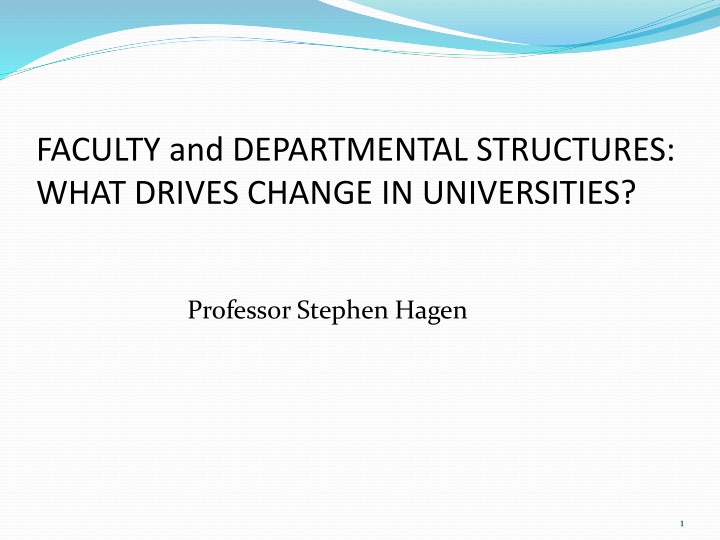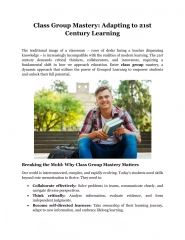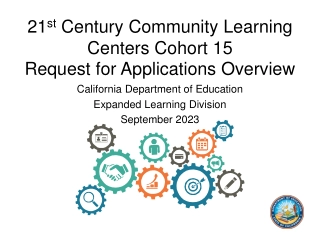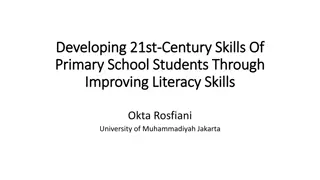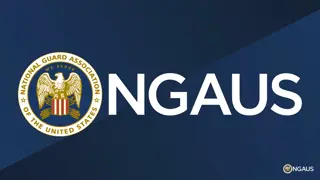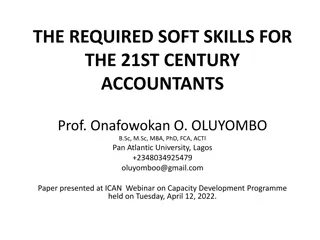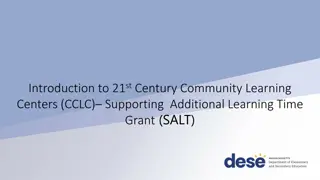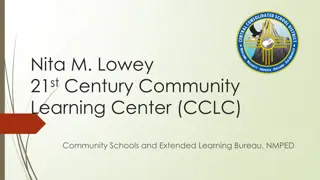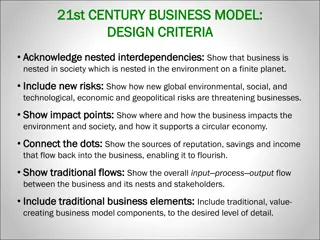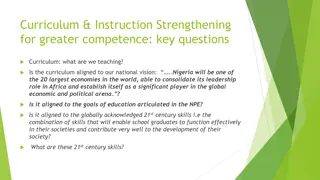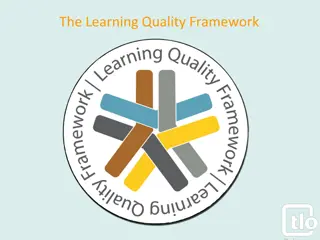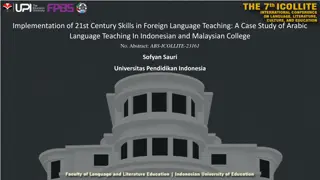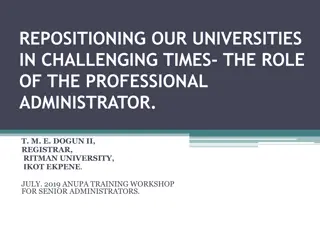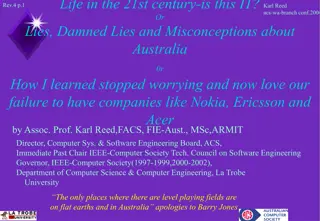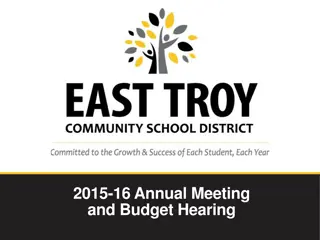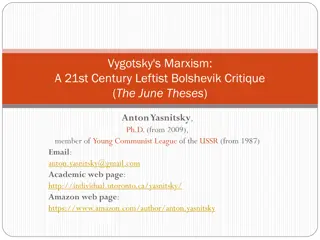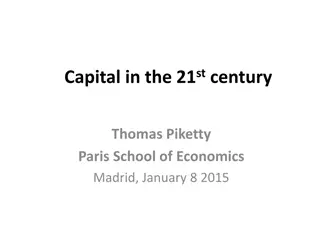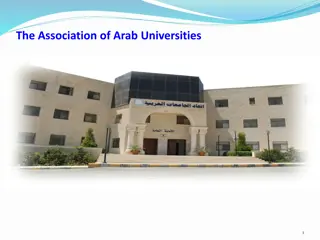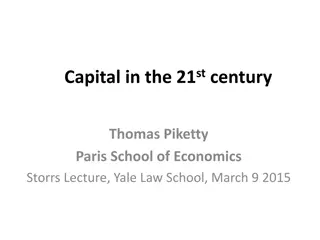Drivers for Change in 21st Century Universities
The shifting landscape of higher education is driven by various factors including student expectations, global economic pressures, research optimization, technological advancements, and the need for financial sustainability. Universities today must adapt to meet evolving demands and stakeholder expectations, both locally and globally.
Download Presentation

Please find below an Image/Link to download the presentation.
The content on the website is provided AS IS for your information and personal use only. It may not be sold, licensed, or shared on other websites without obtaining consent from the author.If you encounter any issues during the download, it is possible that the publisher has removed the file from their server.
You are allowed to download the files provided on this website for personal or commercial use, subject to the condition that they are used lawfully. All files are the property of their respective owners.
The content on the website is provided AS IS for your information and personal use only. It may not be sold, licensed, or shared on other websites without obtaining consent from the author.
E N D
Presentation Transcript
FACULTY and DEPARTMENTAL STRUCTURES: WHAT DRIVES CHANGE IN UNIVERSITIES? Professor Stephen Hagen 1
Drivers for Change in a 21st Century University The higher expectations of students as fee-payers and consumers the pressure of a global economic crisis impacting on university funding streams; To optimize research quality and outputs The pressure to create larger universities and obtain a critical mass Partnerships with companies, other universities and local schools and colleges the emergence and development of an HE global market which will lead to increasingly differentiated offers from universities and where providers will have to recognise and deliver what they are good at; Increasing adoption of online learning and other technologies (and impact on learning methodology) provision that is increasingly shaped by the needs of employers, professions and markets rather than the expectations of individual academics increasing pressures on the financial stability and sustainability of universities global rankings and comparisons rather than national or regional benchmarking; rising expectations among all stakeholders internal and external; but especially pressure from government to drive the local economy competition increasing within and beyond the HE sector, both at home and overseas 2
The Universitys 21stCentury Agenda... Students at the heart of the University Shared facilities with other universities World position in Global ratings All-year operation Pervasive use of new technologies Excellent employment prospects Grow research in distinctive and strategically important academic disciplines Student centred learning experience Common Core Skills and Employment skills Strong and dynamic strategic alliances feeder schools Vibrant applied research and innovation culture Gateway between the regional and the global economy Innovation and business Develop international research partnerships Increase on-campus overseas student recruitment Expand and improve business engagement Intellectual property management Triple helix partnership with industry and government Distinctive and Study Abroad opportunities Entrepreneurial approach to applying knowledge and expertise professional higher education Connected, contributing and celebrating alumni achievements High-impact with company and in company provision 3
Professional, employment-focused education Transforming lives Positive impact on the economy, society and culture of society Distinctiveresearch Economic, social and cultural need Research-informed innovation and business engagement Inspire individuals, organisations and communities Partnerships Entrepreneurship Magnet for enterprise Force for health and well being Innovation Exchange for knowledge Social change and inclusion Engine for social and economic regeneration Excellent student experience Excellence in learning and teaching Environmentally-aware and sustainable Ethical, open, collaborative and professional work ethos Developing the creative, innovation and entrepreneurial capabilities Creativity High quality learning, researchandenterprise Engagement 4
INSPIRE INDIVIDUALS, ORGANISATIONS AND COMMUNITIES POSITIVE IMPACT ON THE ECONOMY, SOCIETY AND CULTURE OF THE COUNTRY VISION & MISSION TRANSFORMING LIVES OF PEOPLE & PLACES PROFESSIONAL, EMPLOYMENT- FOCUSED EDUCATION RESEARCH-INFORMED INNOVATION AND BUSINESS ENGAGEMENT FORCE FOR HEALTH AND WELL BEING EXCELLENCE IN LEARNING AND TEACHING ENGINE FOR ECONOMIC REGENERATION DISTINCTIVE RESEARCH EXCELLENT STUDENT EXPERIENCE SOCIAL CHANGE AND INCLUSION EXCHANGE FOR KNOWLEDGE DEVELOPING THE CREATIVE, INNOVATION AND ENTREPRENEURIAL CAPABILITIES COLLABORATION MAGNET FOR ENTERPRISE BRIDGE TO THE WORLD PROFESSIONAL ... INNOVATIVE ... ETHICAL ... OPEN ... ENGAGED ... CREATIVE ... ENVIRONMENTALLY AWARE 5
PRIORITY # 1 Enhance research outputs and quality of publications Grow applied research and innovation capability, depth and breadth in distinctive and strategically important academic disciplines Provide a space for debate and discussion, cultural development Inform learning and teaching; stimulating discussion, debate and dissemination of ideas Develop a vibrant applied research and innovation culture which attracts and retains first class staff and outstanding research students Become one of our country s leading universities offering students an entrepreneurial approachto applying knowledge and expertise to the real world 6
PRIORITY # 2 Focus on Raising Quality of Student Experience Students will be at the heart of the University ... choosing the experience and skills they wish to develop offered innovative, employer focused curriculum and a variety of ways to engage with learning Student Voice ... effective representation and engagement in decision-making processes underpinned by engaging staff and high quality facilities Deliver distinctive and professional higher education ... on and off campus across the region and beyond on-line learning Intellectual fusion ... programme design will focus on achieving greater multi- disciplinarity, inter-disciplinarity and trans-disciplinarity across subjects in the curriculum Emphasis on a high quality student centred learning experiencewith defined learning outcomes Ensure Excellent employment prospects for all Celebrating alumni achievements Regular reviews of faculty by students ( student evaluations ) 7
PRIORITY # 3 International & Globally Connected Develop international partnerships for research and faculty & student exchanges where the academic fit is complementary and relevant, and where the benefits of partnership are mutual Increase on-campus overseas student recruitment, e.g. by exploiting further the relationship with Study Group, including BRICS, including Asia, South-East Asia, Latin America Offer Study Abroad opportunities to expand the horizons of our own students Increase English Language medium study Set up International Fellowships 8
PRIORITY # 4 Entrepreneurial Create a culture of enterprise on the campus Protect IPR, encourage student start-ups and research spin-outs Diversity income-streams (active Business School, consultancy, training, sales of materials, summer schools, lease campus space & facilities) Offer Study Abroad opportunities to expand the horizons of our own students Increase English Language medium study 9
UNIVERSITY MANAGEMENT Vice Chancellor PVC Director of Human Resources DVC DVC (External Relations & International Development) Director of Finance (Academic) (Learning Support) Director Portfolio Developmen t & Academic Planning Vacant Exec Dean Educatio n & Social Sciences Carl Peters Dean Research & Graduate Studies Hefin Rowlands Director of Centre for Excellence in Learning & Teaching (CELT) Jo Smedley Director Commercia l & External Services Michael Hill University Registrar & Clerk to the Board of Governors Sarah Clark Associate Director HE in FE Partnership Angela Lewis Director of Facilities Managemen t Stephen Godber Exec Dean Arts & Business TBC Dean of Internationa l Office Graham Wood Graduat e School Head of School of Sport, Health & Applied Social Sciences Nicky Lewis Head of Newport Business School Sian Rees Head of Centre for Digitally Enhanced Learning Paul Andrews Deputy Director (Curriculum) UHOVI Francis Cowe Head of Student Services Lawrence Wilson Head of Facilities Services Helen Powell Head of School of Film, Photography & Digital Media Barry Atkins Head of School of Education Karen Morris Head of Estates Services Liam Sullivan Head of City Campus Learning Support Dawne Leatherdale Welsh Languag e Organisation Design & Development Financ e Data Services Human Resources Head of School of Humanities & Lifelong Learning Jenny Cann Head of School of Design , Engineering, Fashion & Technology Jenny Hann Head of Information Services Michael Webb Head of Caerleon Campus Learning Support Madeleine Rogerson Associate Director, CELT Bela Arora 10
Deputy Vice Chancellor (Academic) Stephen Hagen FACULTY AND SCHOOL MANAGEMENT Executive Dean Arts &Business Vacant Executive Dean Education & Social Sciences Other Posts Reporting to DVC (Academic) PA Ann Maloney PA Jan Szary Head of Faculty Administration Sheena Haddock Head of Faculty Administration Nuala Meadows Project Manager QWEST Lyn Waddington R&KE Administrator Joan Fothergill Head of School of Film, Photography & Digital Media Barry Atkins Head of School of Sport, Health & Applied Social Sciences Nicky Lewis Head of Newport Business School Sian Rees Head of School of Design, Engineering, Fashion & Technology Jenny Hann Head of School of Humanities & Lifelong Learning Jenny Cann Head of School of Education Karen Morris Academic Subject Leader Undergraduate Programmes Edward Jones Head of Community Programmes Kirsten Merrill- Glover Academic Subject Leader Photography Paul Cabutts Academic Subject Leader Inter-professional Practice Michelle Culwick Academic Subject Leader Education & Linked Awards Jane Williams Academic Subject Leader Secondary ITT Keri Green Academic Subject Leader Computing & Engineering Eric Llewellyn Academic Subject Leader Psychology & Creative Therapies Vacant Academic Subject Leader Postgraduate Programmes Lyndon Murphy Academic Subject Leader Performance, Sound & Music Andy Smith Academic Subject Leader Postgraduate Programmes Shirley Egley Academic Subject Leader Primary ITT Elizabeth Barry Academic Subject Leader Fashion & Design Mark Jackson Head of Research Janet Pinder Director of Sport & Health/Wellbeing Vacant Academic Subject Leader Professional Programmes Jared Davies Academic Subject Leader Film , Games & Animation Vacant Academic Subject Leader PcET (including Franchise) Richard Lander- Clarke Academic Subject Leader Humanities David Norcliffe Sports Centre Ryan Statton Access & Foundation 11
THE ROLE OF THE DEPUTY VICE- CHANCELLOR FOR FACILITIES, LEARNING SUPPORT AND REGISTRY Chair of Board of Governors Deputy Vice Chancellor (Learning Support) Director of Facilities and Campus Management Director of Learning & Teaching University Registrar Records & Informatio n Manager Matthew Cooper Head of Student Records Debb Baff Committee Manager Lesley Douglas Head of Centre for Digitally Enhanced Learning Head of City Campus Learning Support Head of Quality Support Head of Caerleon Campus Learning Supportn Head of Student Services & careers Head of Student Experience Head of Admissions & Enrolment Kath Birden Curriculum Officer Dirk Bieber Administrato r X 1.5 FTE Kay Cashman Julie Wallen Study Advice Tutors Library Staff Careers Services Purchasing administrator Regional Dev t Officer Library Staff Deputy Head Student Mentor Manager Counsellors Disability Support Healthcare Student Finance Quality Officers Assessment Officer Marc Turner Admissions & Enrolment Administrator Sian Hossington Lyne Pope Colin Morgan Michelle Alyeo- Thomas Andy Prescott Maria Smart Assessment & Awards Admin Mary Davies/ Joanne Paling 12
Committee Structure BOARD OF GOVERNORS SENATE (ACADEMIC BOARD) Finance and Major Projects Committee Strategy Review Committee Learning and Teaching Committee Audit Committee School Boards Research Committee Nominations Committee Interdisciplinary and Work-based Programme Board Community Engagement Committee Remuneration Committee Culture and Welfare Committee Regulatory sub- committees (including Academic Appeals, Ethics and Student Complaints Committees, and Student Disciplinary and Offences Board) Ad hoc, time-limited, sub-committees and working groups International Strategy Committee 13
Relationship between Management Structure and Academic Board and its Sub Committees Academic Board is chaired by the Rector and the main policy sub committees are each chaired by a member of Senior Management Committee thus maintaining a conduit between the College s executive structure and its deliberative and consultative fora. The organisational sub committees (i.e. Faculty Committees) are chaired by Heads of Faculty. Heads of service relevant to the deliberations of these Committees also attend or delegate a member of staff to attend. Course Committees are chaired by the Subject Leader responsible for the course. Heads of Faculty attend Course Committees are members are representative of service areas (academic registry, quality team, marketing etc.) relevant to the course s operation. 14
Deans of Faculty The Head of Faculty is responsible for the leadership and overall management of the provision within a Faculty. Duties include: managing the Subject Leaders in the Faculty, conducting annual appraisal reviews and ensuring that Faculty staff have appropriate staff development (supported by Human Resources); leading and coordinating academic planning and development in the Faculty (in consultation with Management Committee and in line with the strategic plan); managing the Faculty budget and ensuring the effective utilisation of the Faculty s resources (supported by Business Support); representing the Faculty ex officio on Academic Board and its Sub Committees; chairing the Faculty Committee, taking an overview of the quality and standards of the provision in the Faculty and ensuring that College policies and procedures are being implemented; liaising with College support services in respect of the Faculty s needs. 15
Course Leaders Each course has a designated Subject Leader who is responsible for its day-to-day course leadership. Subject Leaders line manage the Senior Lecturers, Lecturers and Sessional Lecturers primarily involved in teaching students on the course(s) for which they are responsible. Subject Leaders are responsible for ensuring the efficient and effective discharge of the responsibilities of all course contributors in the provision of teaching, learning support and assessment. Their duties include: ensuring the effective organisation and timetabling of the course (supported by Business Support); implementing the University s policies and regulations (supported by the Quality Team/Registry); leading the academic development of the course and preparing course documentation for internal and external validation (supported by the Quality Team); interviewing and selecting students for admissions (supported by Registry) and organising the course based induction; organising the election of Student Course Representatives and liaising with these representatives (supported by the Quality Team); Chairing the Course Committee (supported by the Quality Team); monitoring and evaluating continuously the quality and standards of the student experience and outcomes, and providing the Annual Course Monitoring Report on the quality and standards of the course (supported by the Quality Team and Registry/MIS); gathering student feedback about the course and its constituent units (supported by the Quality Team); 16
Academic Autonomy 7 7 3 11 All new programmes must be submitted Universitiescanopendegree programmeswithout prior accreditation: AT,CH,IE,LU,to accreditation to NO,SE,UK be funded: FR,NL, ES All newprogrammesmust be submitted toaccreditation to Other restrictions: be introduced:BB(DE),CZ, DK,GR,HE(DE),HU,IT,LT, NRW (DE),PT,SK CY,EE,FI,IS,LV, PL,TR 17
Comparisons between countries Many universities retain near- complete freedom in choosing the language of instruction and designing the content of degree programmes. But nearly all face limitations when deciding on overall student numbers and admission mechanisms. Universities may still set selection criteria for Master s programmes in a majority of systems. With regard to accreditation and quality assurance, regional and national situations differ strongly. Options here range from no formal accreditation requirements to compulsory accreditation for Bachelor programmes, Master s programmes or both, and from a free choice of quality assurance procedures and providers, to the ability to select neither 18
To Summarise With regard to academic autonomy, recent reforms of quality assurance processes in particular have had a strong impact. Most countries impose some regulations on the overall number of students. Free admission for everyone holding the basic qualifications is now the exception. 19
Summary cont. The introduction of new degree programmes usually requires some form of approval from a public authority. In approximately 25% of European countries, universities are able to open degree programmes without prior accreditation. In most of the remaining systems, universities require prior accreditation for programmes to be introduced or publicly funded. This picture is very similar for Bachelor and Master s programmes; it only differs more strongly in the case of doctoral programmes where most countries can open doctoral programmes without external authority Universities in most countries have full authority to close programmes. 20
Conclusions Universities are restructuring their Faculties and Departments often to reflect the Agenda for the 21st Century The agenda is global, student-oriented, economically-driven and research-led Future reforms should focus on giving universities greater freedom in setting their own admission criteria and setting fees. The trend is increasingly towards academic autonomy, linked to strong external quality assurance mechanisms. It will also be crucial to find the right balance between autonomy and accountability by promoting institutional audits or evaluations of internal quality processes. 21
